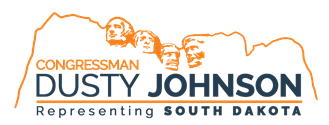
Johnson Levels the Playing Field for Tribes
Washington, D.C. – U.S. Representatives Dusty Johnson (R-S.D.) and Sharice Davids (D-KS) introduced the GSA Disposal Process Tribal Parity Act. The General Services Administration’s (GSA) disposal process allows the federal government to sell unused, excess public buildings to states and local governments at or below market value if they are to be used for a specified public benefit. Johnson’s bill will allow tribal governments to participate in that process.
“There is a great need for public facilities for tribes, whether that is for schools, housing, or law enforcement needs,” said Johnson. “This bill will correct an oversight and allow tribal governments to have the same access to the disposal process as state and local governments, helping them save money and meet their facility needs.”
“The Lower Brule Sioux Tribe is very thankful for the GSA Disposal Process Tribal Parity Act that will benefit Tribes with much needed surplus equipment that will immediately make an impact in tribal communities,” said Lower Brule Sioux Tribe Chairman Clyde J.R. Estes.
The GSA Disposal Process Tribal Parity Act is also supported by the Crow Creek Sioux Tribe and Standing Rock Sioux Tribe. Identical legislation was introduced in the Senate earlier this year by U.S. Senators Alex Padilla (D-CA) and James Lankford (R-OK).
Background:
When the federal government determines they no longer need a public building, the General Services Administration (GSA) has a process to offer such property to states and local governments. Unfortunately, tribal governments are currently not included in this process.
The GSA’s disposal process requires the Public Buildings Service (PBS) to first offer excess property to other federal agencies. Should no federal agency identify a need, the property is deemed as “surplus” and becomes available for states and local governments to purchase below the fair market value if used for public benefit conveyance. Public benefit conveyance means that the property must serve a specified public benefit, such as use for law enforcement, emergency management, education, public airports, highways, etc.
Tribal governments are left out of this process. Should a tribe seek to acquire excess federal property, they would not be able to purchase said property until PBS makes it available for public sale.
Tribes across the country have outsized needs for schools, housing, and law enforcement facilities – the GSA Disposal Process Tribal Parity Act ensures these governments have a fair opportunity to obtain excess federal properties to meet these needs.
The GSA Disposal Process Tribal Parity Act would:
- Insert “Indian tribe” to sections of 40 U.S.C. 550 to ensure tribal governments are welcomed into the process along with local and state governments seeking to acquire surplus property for public benefit.
- Require the GSA administrator to submit an annual report to Congress on the outreach done to provide notice to tribes on availability of surplus federal real property.
- Require the GSA to establish a process to manage competing applications made by states, local governments, and tribal governments two years after the bill’s enactment.
Read full bill text here.
###
